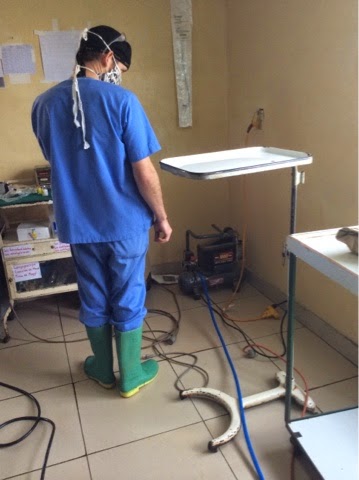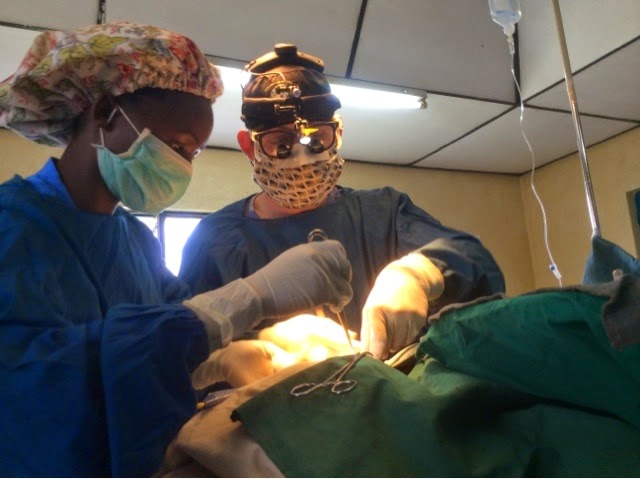Each week, Redeemer is going to start posting weekly blog posts from a dear family who has been a part of the Redeemer Church family for years who moved to Africa to do medical education for 9 months. The Sund Family, Greg, Stephanie, Ella, Biniyam, and Mekdes moved to Burundi for the last 7 months and we the people of Redeemer to be up to date on all that they are doing and all that is happening in Africa. In Greg's own words, he has shared below why they wanted to go.
“You know that those who are regarded as rulers of the Gentiles lord it over them, and their high officials exercise authority over them. Not so with you. Instead, whoever wants to be great among you must be your servant, and whoever wants to be first must be slave of all. For even the Son of Man did not come to be served, but to serve, and to give his life as a ransom for many” - Mark 10:42-45
(Greg) This is the paradox and the beauty of the Christian faith, that God Himself became meek and lowly to serve us, and to adopt us into His family. That is why we go. We go, because He came to us. We serve, because He first served us.
Below is the Sund's latest blog post from Africa called "Walking With The Poor".
-----------------------------------------------------------------
“Poverty is about relationships that don’t work, that isolate, than abandon, or devalue. Transformation must be about restoring relationships, just and right relationships with God, with self, with community, with the ‘other’ and with the environment.”
What is poverty? One topic that has become of great interest to me since coming to Burundi is that of transformational development. The above quote is from a book that I have begun reading called Walking With The Poor: Principles and Practices of Transformational Development by Bryant L. Myers. This book has helped me better understand the complexity of poverty as well as the importance of approaching development work from a holistic perspective. In addition to this, more and more I am realizing how confused my thinking about poverty has been and how much I still have to learn.
Walking With The Poor starts with a brief history of the idea of development work, an idea that did not even come into existence until the mid 1900s. While the idea of “charity” existed long before this, the idea of working towards development and poverty alleviation was not articulated until more recently. Even once this idea began to be discussed, for decades many considered poverty just in terms of material wealth. Over the last 20 years, the discussion has shifted as our understanding of what poverty is has become more complex.
The idea of poverty being about broken relationships has shifted the entire paradigm of development work, and I have seen how this shift in thinking is playing out here at Kibuye and among other development groups working in East Africa. As an example, the long-term missionaries we are working with at Kibuye spent an entire year of language study before settling here. They did this because they understood that one cannot develop meaningful relationships with people without understanding and speaking their own “heart language”. They also have committed to being here for many years, because as well, relationships are not developed and nurtured over a few weeks but rather over months, years and decades. While I have learned enough French to get by in the hospital and teach the points I think are important for my students, my fluency in French is far from being at the point where I can truly relate to the people I am working with (aside from the few who speak English). And my Kirundi is almost nonexistent, which prohibits me from developing relationships with my patients, our guards and our house-helper (all people who I desperately want to know more deeply).
I will confess that to my shame, my motivation for coming to Africa has often been because I want to rescue needy people. The problem is, I am just as needy as the people I came to rescue. And I am learning that, historically, it is the people and groups who have come with this very attitude who have done the most damage. My thinking, my attitude, and my heart all need changing.
Another aspect of poverty that this book discusses, which was new to me, is the “poverty of the non-poor”. While those living in poverty are often trapped in a web of lies about their own self-worth and value, the non-poor are often equally entrapped in a web of lies about the significance of their (our) wealth and material possessions, believing that it is our cars, homes and retirement savings that define us, and sometimes believing that because we possess these things, that our value and worth is greater than that of those without these possessions. As Brad Pitt said in Fight Club, “eventually, the things we own, begin to own us”. Sadly, this has often been (and still is) true of my own heart, and is often reflected in how I live. Oh Brad Pitt, you are as wise as you are handsome.
This idea of poverty being about broken relationships also is a great reminder to me of the Gospel. It was God who has done the ultimate work of restoring our broken relationship with Himself, by sending His Son, Jesus Christ, to save, to redeem and to restore us to our Creator and Father, who loved us enough to not leave us in our impoverished condition. This is for me, the ultimate motivation to continue in this labor. This is the source of our drive, as well as the goal for which we strive. May God receive the glory for His work.
“Unless someone like you cares a whole awful lot, nothing is going to get better. It’s not." - Dr. Seuss










